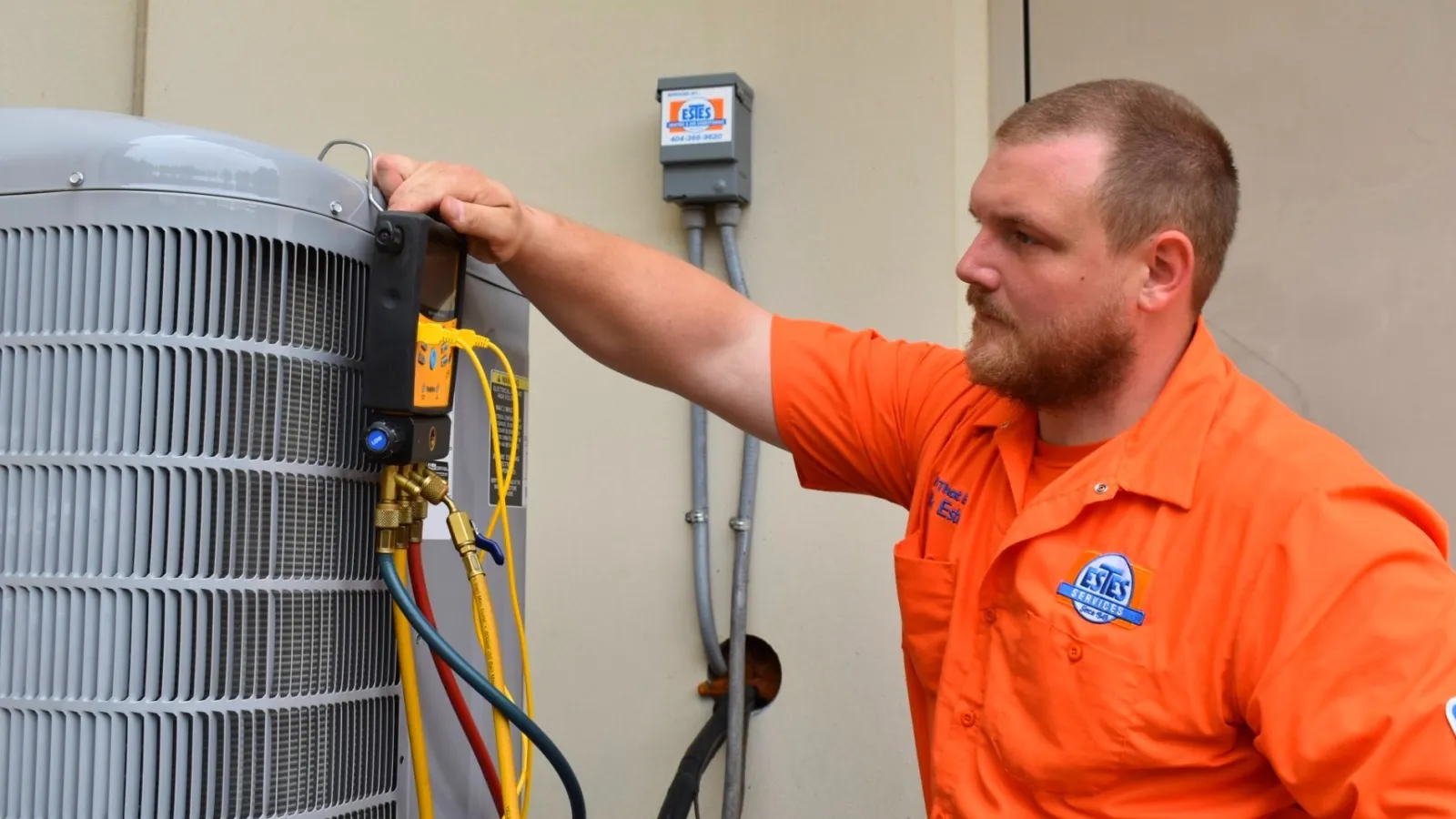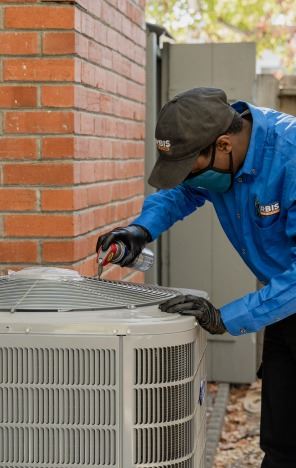Selecting In Between a Heatpump and Heating System: Key Considerations for Your HVAC Requirements
When assessing home heating options for HVAC requires, the decision in between a heatpump and a furnace can be complex. Each system supplies unique advantages customized to particular climates and power effectiveness goals. Recognizing these differences is vital for making an informed selection. Secret factors such as installment costs and ecological effect further make complex the choice procedure. Which choice truly lines up with one's convenience and sustainability preferences? The following areas will certainly check out these considerations carefully.
Comprehending Warmth Pumps: How They Function and Their Advantages
While numerous homeowners take into consideration various home heating options, comprehending just how warmth pumps function and their advantages can significantly influence their choice. Warmth pumps operate by moving warmth as opposed to producing it. In the winter season, they extract warmth from the outdoors air or ground and move it inside, while in the summertime, they reverse this procedure, cooling down the home by removing warmth outside. This twin functionality makes them flexible for year-round environment control.One of the primary benefits of heatpump is their power performance. They use significantly much less electricity compared to conventional heating unit, possibly causing reduced energy bills (heat pump replacement ooltewah tn). In addition, heat pumps have a smaller carbon footprint, making them an eco-friendly selection. They additionally call for much less upkeep than traditional systems, adding to long-term expense financial savings. On the whole, recognizing the technicians and benefits of heatpump can aid home owners make educated choices concerning their home heating and cooling needs
Discovering Heating Systems: Types, Operation, and Benefits
Heaters can be found in numerous kinds, including gas, electric, and oil models, each with distinct operational mechanisms. Understanding these differences is vital, as they affect efficiency and heating efficiency. Furthermore, heating systems provide numerous advantages, such as constant warm output and integrity in cooler climates.
Types of Furnaces
Heating unit can vary substantially in style and operation, with heaters being a preferred option among home owners. There are several kinds of heaters, each using various gas sources and technologies. Gas heating systems are typical, leveraging natural gas to generate heat successfully. Electric furnaces, on the other hand, use electrical resistance to create warmth, commonly preferred for their straightforward setup. Oil heaters, while much less usual, work in locations with restricted gas accessibility (furnace replacement). Additionally, condensing heating systems take full advantage of energy effectiveness by recycling and recording exhaust gases. Each type runs via a system of warm exchangers and ductwork to disperse cozy air throughout a home. Understanding the distinctions in between these furnace types is necessary for informed heating and cooling choices
Benefits of Furnaces
For property owners seeking reputable warmth during cold months, the advantages of heaters are significant. Furnaces supply regular heating, guaranteeing also temperature levels throughout the home. They are particularly efficient in extreme chilly, frequently surpassing heatpump in cold conditions. Various types, including gas, electrical, and oil furnaces, provide versatility to satisfy varied requirements and preferences.Furnaces likewise have a tendency to have reduced first installment prices contrasted to heatpump, making them an extra accessible option for many. Their robust layout adds to a much longer life-span, with several devices lasting over 15 years with correct maintenance. Furthermore, modern furnaces are frequently geared up with advanced modern technology for boosted performance, which can result in reduced power bills. Generally, furnaces continue to be a trustworthy option for efficient home heating.

Power Effectiveness: Contrasting Warm Pumps and Furnaces
When contrasting power efficiency in between heatpump and heating systems, the Seasonal Power Efficiency Ratio (SEER) plays a crucial role in figuring out efficiency. Additionally, an operational price evaluation reveals the long-lasting economic effects of each system. Understanding these elements can guide house owners in making educated choices about their heating services.
Seasonal Energy Effectiveness Proportion
Power performance plays an important function in the decision-making procedure between heatpump and heating systems, particularly when thinking about the Seasonal Energy Performance Ratio (SEER) This metric measures the cooling efficiency of heat pumps over an entire cooling season, providing a standardized way to assess performance. Higher SEER scores show better energy efficiency, converting to reduced power usage and minimized utility bills. In contrast, furnaces are usually examined utilizing the Annual Fuel Application Performance (AFUE) ranking, which shows heating efficiency. When contrasting these 2 systems, home owners must prioritize SEER ratings for heat pumps, as they straight effect general energy financial savings and ecological sustainability. A complete understanding of SEER can significantly influence the long-term contentment and cost-effectiveness of the picked a/c service.
Functional Expense Analysis
Recognizing the operational expenses related to heatpump and furnaces is important for property owners evaluating their choices. Heat pumps generally supply higher energy performance, converting electrical power into warm with minimal waste. This leads to reduced month-to-month energy expenses, specifically in modest environments. Conversely, standard heating systems, particularly gas designs, might have reduced ahead of time costs but can sustain greater functional costs gradually as a result of sustain rates and performance ratings.Moreover, heat pumps can function as both heating and cooling systems, potentially minimizing the demand for different heating and cooling devices. While initial investments for warmth pumps may be higher, their long-lasting financial savings in energy performance can make them a much more cost-efficient selection for many families. Mindful analysis of local energy prices is vital to figure out the most effective option.
Installation Costs: What to Expect for every Heater
Installment prices for heating unit can differ considerably between heat pumps and furnaces, influencing property owners' decisions. Heatpump usually have greater ahead of time installment prices, typically ranging from $3,500 to $8,000, depending upon the unit dimension and intricacy of setup. This includes the outside system, indoor handling system, and needed ductwork modifications. Alternatively, furnaces often tend to have lower preliminary costs, averaging between $2,500 and $6,000, which can be appealing for budget-conscious home owners. Nonetheless, installment costs can boost if substantial ductwork is required.Moreover, the option of fuel type for furnaces-- all-natural gas, lp, or electric-- can additionally affect setup costs. While heatpump offer power effectiveness, their initial financial investment might deter some customers. Eventually, assessing installation expenses alongside lasting financial savings and performance will certainly assist house owners in making informed choices regarding their heating unit.
Climate Factors To Consider: Which System Executes Much Better in Your Location
Just how do environment conditions affect the effectiveness of home heating systems? The performance of heatpump and heaters can vary greatly relying on the local climate. In modest climates, heat pumps succeed by successfully moving warmth from the outside air, making them an energy-saving choice. However, their effectiveness decreases in incredibly cold temperatures, where they may struggle to remove enough heat. On the other hand, heating systems, specifically gas models, give constant and trustworthy warm despite outside problems, making them more suitable in colder regions.In locations that experience milder winters, heatpump can operate successfully year-round, providing both cooling and heating. In comparison, regions with harsh winter seasons often take advantage of the robustness of heating systems. Ultimately, comprehending the regional climate is important when determining in between a warmth pump and a heating system, as pop over to this web-site it straight impacts their functional performance and overall performance.
Upkeep Needs: Long-Term Take Care Of Warm Pumps vs. Furnaces
While both heat pumps and heating systems need normal upkeep to assure peak efficiency, their specific requirements and care routines vary significantly. Heating systems generally need less constant interest, with annual evaluations being sufficient to look for gas leaks, clean filters, and analyze overall capability. Their easier design often allows for uncomplicated repairs.In contrast, heat pumps necessitate biannual maintenance due to their dual function in home heating and cooling. This includes cleansing coils, inspecting refrigerant levels, and making certain that both the indoor and exterior systems operate at their best. In addition, heatpump maintenance often includes more complex parts, making professional servicing essential.Neglecting upkeep can result in lessened effectiveness and boosted power prices for both systems. Eventually, home owners must think about these long-term care requirements when selecting in between a warm pump and a heater, as proactive maintenance can extend the life expectancy and efficiency of either system substantially.
Environmental Effect: Selecting a Lasting Heating Option
The ecological influence of heater is a vital evaluation for home owners seeking lasting choices. Warmth pumps are normally more energy-efficient than conventional heating systems, as they transfer heat instead than generate it, substantially decreasing carbon exhausts. By utilizing sustainable power sources, such as air-source or geothermal heatpump, homeowners can better minimize their environmental footprint.On the other hand, gas furnaces emit greenhouse gases and add to air contamination, though they usually give greater warmth result. Nevertheless, innovations in technology have caused the advancement of high-efficiency furnaces that decrease emissions.Ultimately, choosing a heating unit entails considering effectiveness against ecological impact. House owners are motivated to review local power sources and motivations for sustainable systems, guaranteeing a selection that aligns with both individual convenience and environmental duty. The decision influences not only instant convenience however additionally long-lasting sustainability and ecological health.
Regularly Asked Inquiries
For How Long Do Warm Pumps and Furnaces Typically Last?
The life expectancy of heat pumps normally varies from 15 to twenty years, while heaters can last in between 15 to three decades. Routine maintenance substantially influences their durability and efficiency in giving heating services.
Can I Make Use Of a Heatpump in Incredibly Cold Climates?
Heatpump can run in extremely cold climates, however their performance diminishes as temperatures decrease. In such problems, supplementary home heating resources go to these guys might be required to preserve comfortable interior temperature levels and ensure peak performance.

What Is the Noise Degree of Warmth Pumps Versus Furnaces?
The noise levels of warmth pumps and heating systems differ substantially. Typically, heat pumps run more silently than conventional heating systems, making them preferable for those delicate to sound, while heaters may produce louder functional sounds throughout home heating cycles.
Are Warm Pumps Suitable for Both Cooling And Heating?
Heat pumps are undoubtedly suitable for both cooling and heating (heat pump installation ooltewah tn). They work by transferring warm, giving effective temperature level control year-round, making them a flexible selection for property owners looking for an all-in-one heating and cooling option
What Dimension Furnace Do I Required for My Home?
Establishing the suitable dimension furnace for a home requires assessing variables such as square video, insulation quality, regional environment, and the home's layout. Consulting an expert can assure an accurate evaluation and excellent comfort. Warm pumps normally use greater energy efficiency, converting electrical power right into heat with minimal waste. In moderate climates, warm pumps stand out by successfully moving heat from the outside air, making them an energy-saving option. Alternatively, heating systems, particularly gas models, Bonuses offer trusted and consistent warm regardless of outside problems, making them more suitable in chillier regions.In locations that experience milder winters, warm pumps can run effectively year-round, providing both heating and cooling. Warmth pumps are usually more energy-efficient than traditional furnaces, as they move heat instead than create it, substantially reducing carbon exhausts. By making use of eco-friendly power sources, such as geothermal or air-source heat pumps, property owners can even more reduce their environmental footprint.On the other hand, natural gas furnaces produce greenhouse gases and contribute to air contamination, though they usually give greater warm output.